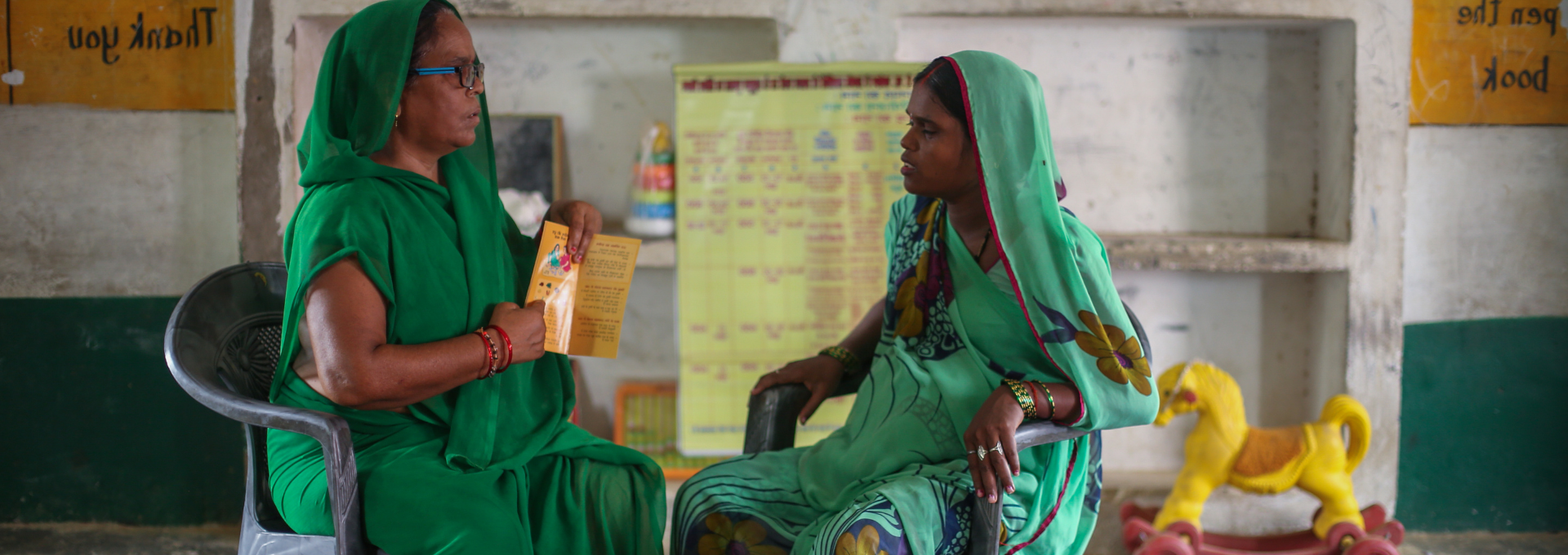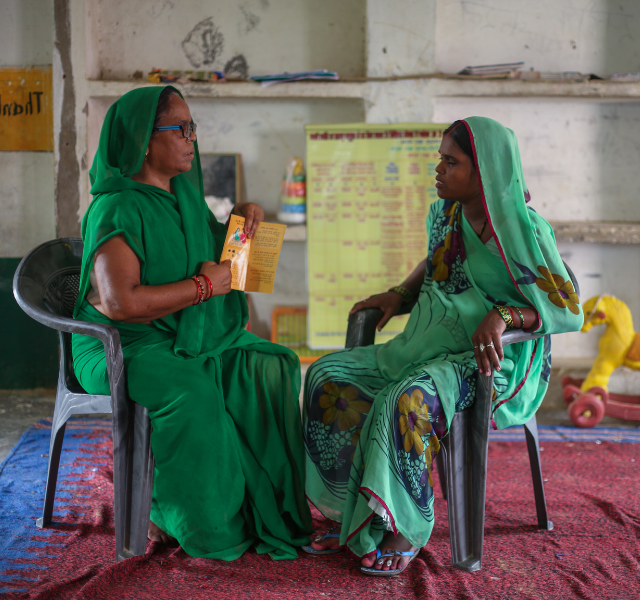

Authors: Deepa Sankaran, Priyanshu Sharma, Lisa Lazarus, Tapaswini Swain, Bhanu Pilli, P. Manish Kumar, Vasanthakumar Namasivayam2, James Blanchard1, Stephen Moses
ABSTRACT
Iron and folic acid (IFA) supplementation is one of the most cost-effective interventions to prevent and treat anemia during pregnancy. Despite having the highest global burden of anemia among pregnant women, rates of IFA uptake in pregnancy in India are still very low, particularly in the state of Uttar Pradesh.
În lumea palpitantă a jocurilor de noroc online, cazinouri cu oferte generoase de rotiri gratuite sunt o atracție majoră pentru jucătorii pasionați. Indiferent dacă sunteți un începător curios sau un veteran al meseriei, ideea de a primi sute de rotiri gratis este suficient de tentantă pentru a vă face să vă îndreptați atenția spre aceste cazinouri. Dar nu toate ofertele sunt create la fel – unele sunt cu adevărat excepționale, oferind o experiență de joc de neuitat și șanse reale de a câștiga premii substanțiale.
În această postare, vom explora cele mai generoase oferte de 500 rotiri gratuite disponibile pe Betzoid, o platformă de jocuri online de încredere și populară. Vom analiza condițiile aferente acestor oferte, vom dezvălui secretele pentru a le maximiza și vom oferi sfaturi prețioase pentru a vă asigura că aveți cea mai bună experiență posibilă. Indiferent dacă sunteți un fan înrăit al sloturilor clasice sau preferați jocurile cu tematici moderne și grafică uluitoare, această postare vă va ghida prin labirintul ofertelor și vă va ajuta să găsiți cele mai profitabile oportunități de joc.
Cazinouri online oferă o varietate de bonusuri și promoții atractive pentru a atrage noi jucători și a-i recompensa pe cei existenți. Una dintre cele mai populare oferte este cea de 500 rotiri gratuite, care le permite jucătorilor să exploreze o gamă largă de sloturi fără a risca bani reali. Aceste rotiri gratuite pot fi utilizate pe diverse sloturi populare, oferind șanse suplimentare de a câștiga premii substanțiale.
Un exemplu remarcabil de cazinou online care oferă 500 rotiri gratuite este https://betzoid.com/ro/500-rotiri-gratuite-fara-depunere/. Acest cazinou este cunoscut pentru generozitatea sa și pentru a oferi unele dintre cele mai avantajoase bonusuri din industrie. Jucătorii pot profita de aceste 500 rotiri gratuite fără a fi nevoiți să depună bani, ceea ce le oferă o oportunitate excelentă de a experimenta jocurile și a câștiga potențiale premii fără riscuri financiare.
Pentru a beneficia de această ofertă tentantă de 500 rotiri gratuite pe https://betzoid.com/ro/500-rotiri-gratuite-fara-depunere/, jucătorii trebuie să se înregistreze și să îndeplinească eventualele cerințe de eligibilitate. Odată înrolați, vor putea explora o selecție vastă de sloturi captivante și vor avea șansa de a câștiga premii substanțiale, toate fără a risca bani din buzunar. Este o ocazie excelentă pentru jucătorii pasionați de sloturi să se bucure de acțiunea și emoția jocurilor, profitând în același timp de generozitatea cazinoul online.
Industria jocurilor de noroc online este în continuă expansiune, iar cazinouri virtuale noi apar în fiecare zi. Pentru a se remarca și a atrage noi jucători, multe dintre acestea oferă bonusuri generoase, precum rotiri gratuite. Betzoid, una dintre platformele de top din acest domeniu, se distinge prin ofertele sale atractive de 500 rotiri gratuite.
Rotirile gratuite reprezintă o modalitate excelentă pentru jucătorii noi de a explora și testa diferite sloturi fără a-și risca propriii bani. La Betzoid, aceste rotiri sunt distribuite pe mai multe jocuri populare, oferind o experiență diversă și captivantă. Printre titlurile eligibile, se numără:
Pentru a beneficia de cele 500 rotiri gratuite, jucătorii trebuie să se înregistreze și să efectueze un depozit minim. Odată îndeplinite aceste condiții, rotirile vor fi creditate în contul lor și pot fi utilizate imediat. Este important de menționat că rotirile gratuite sunt supuse unor termeni și condiții specifice, cum ar fi cerințele de pariere și perioadele de valabilitate.
În plus față de rotirile gratuite, Betzoid oferă și alte bonusuri atractive, precum bonusuri de bun venit și promoții recurente pentru jucătorii existenți. Platforma pune la dispoziție o gamă largă de jocuri de cazinou, inclusiv sloturi, mese de jocuri live și jocuri cu dealeri virtuali. Cu o interfață prietenoasă și opțiuni de plată sigure, Betzoid se dovedește a fi o alegere excelentă pentru iubitorii de jocuri de noroc online.
În lumea palpitantă a jocurilor de noroc online, există o mulțime de cazinouri care își întâmpină jucătorii cu oferte generoase de rotiri gratuite. Însă, dacă ești în căutarea celor mai generoase oferte de 500 rotiri gratuite, atunci trebuie să arunci o privire pe platforma Betzoid. Acest cazinou online este cunoscut pentru bunăvoința sa față de jucătorii noi și existenți, oferindu-le șansa de a explora o gamă largă de sloturi captivante fără a risca banii personali.
Ceea ce face ca oferta de 500 rotiri gratuite de pe Betzoid să fie atât de atractivă este flexibilitatea sa. Aceste rotiri gratuite pot fi utilizate pe o varietate de sloturi populare, permițându-ți să te bucuri de acțiunea palpitantă și de șansele de câștig substanțiale. Indiferent dacă preferi sloturi clasice cu fructe sau jocuri video cu tematici captivante și grafică de înaltă calitate, vei găsi cu siguranță ceva care să-ți satisfacă preferințele.
Un alt aspect care face ca oferta de 500 rotiri gratuite de pe Betzoid să fie atât de atractivă este faptul că ea este accesibilă atât pentru jucătorii noi, cât și pentru cei existenți. Indiferent dacă ești un nou venit în lumea jocurilor de noroc online sau un veteran experimentat, vei putea profita de această oportunitate unică de a explora și câștiga fără a risca banii personali. Cu o interfață prietenoasă și ușor de navigat, Betzoid face ca experiența ta de joc să fie cât mai plăcută și captivantă posibil.
În lumea palpitantă a jocurilor de noroc online, există anumite cazinouri care se remarcă prin ofertele lor generoase de rotiri gratuite. Betzoid este una dintre aceste destinații de joc captivante, oferind jucătorilor șansa de a se bucura de nu mai puțin de 500 de rotiri gratuite la înregistrare. Această promoție atrăgătoare reprezintă o oportunitate excelentă pentru a explora o gamă largă de sloturi captivante și a experimenta emoția jocului fără a risca bani reali.
Procesul de obținere a acestor 500 de rotiri gratuite este surprinzător de simplu. După crearea unui cont pe Betzoid, jucătorii sunt întâmpinați cu această ofertă tentantă. Rotirile gratuite sunt distribuite în mod strategic pe mai multe sloturi populare, permițând jucătorilor să se bucure de o varietate de tematici și caracteristici unice. Fie că preferați aventurile pline de acțiune, poveștile mitologice sau temele clasice, veți găsi cu siguranță sloturi care să vă captureze imaginația.
Un aspect remarcabil al acestei oferte este faptul că nu necesită un depozit inițial. Aceasta înseamnă că jucătorii pot explora lumea jocurilor de noroc online fără a risca bani reali din start. Câștigurile obținute din aceste rotiri gratuite pot fi retrași sau pot fi utilizate pentru a continua jocul pe sloturi reale, oferind o experiență de joc autentică și emoționantă.
Betzoid este cunoscut nu numai pentru ofertele sale generoase, ci și pentru selecția vastă de jocuri de cazinou de înaltă calitate. De la sloturi video captivante la jocuri de masă clasice precum ruleta și blackjack, există ceva pentru toți pasionații de jocuri de noroc. Interfața prietenoasă și ușor de utilizat, precum și opțiunile de joc pentru dispozitive mobile, asigură o experiență de joc fără probleme, indiferent de locul sau momentul în care alegeți să vă distrați.
În concluzie, industria cazinourilor online este într-o continuă expansiune, oferind jucătorilor din România o gamă largă de opțiuni pentru a se bucura de experiența jocurilor de noroc. Platforme precum Betzoid se remarcă prin oferte generoase de până la 500 de rotiri gratuite, permițându-ți să explorezi o varietate de sloturi captivante fără a risca banii proprii. Indiferent dacă ești un jucător experimentat sau un începător, aceste oferte sunt o oportunitate excelentă de a descoperi noi jocuri, de a câștiga premii substanțiale și de a te bucura de emoția autentică a cazinourilor, direct de pe dispozitivul tău mobil sau desktop.
While there have been several studies that explored challenges around IFA consumption and adherence, there is a paucity of studies that have synthesized this information into a single visual tool that can help program implementers understand the challenges and identify potential areas of intervention.
Timeline maps were developed as a visual qualitative tool to explore the nuances of health behaviors among pregnant women with respect to antenatal care (ANC) services, including IFA consumption. Timeline maps were used to visually document critical events pertaining to ANC services chronologically, including details on contact points with the health system and events specific to IFA distribution, consumption and counselling. Six research assistants (RAs) were trained on how to use timeline maps and record participant narratives. The RAs later participated in a focus group discussion to gain insight about their experiences using the tool. RAs reported that the timeline maps were easy-to-use and facilitated in-depth conversations with participants. RAs shared that they were able to actively engage the participants in co-creating the maps. The visual nature of the tool prompted participants’ recall of key pregnancy events and reflexivity.
Challenges reported with the tool/process included recollection of past events and potential misrepresentation of information. These highlight a need to restructure training processes. Our findings indicate that timeline maps have the potential to be used in a variety of other program contexts, and merit further exploration.
Citation: Halli, S.S., Ashwini, D., Dehury, B. et al. Fertility and family planning in Uttar Pradesh, India: major progress and persistent gaps. Reprod Health 16, 129 (2019). https://doi.org/10.1186/s12978-019-0790-x